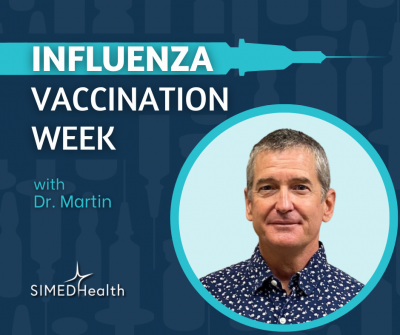
Urgent Care physician Calvin Martin, MD discusses the flu and ways to protect yourself and those you love!
To schedule your annual visit and flu shot with your primary care provider, click here.
To schedule your flu shot and/or covid vaccine with the SIMEDHealth Pharmacy, click here.
What is the Flu?
The Flu is an acute viral respiratory illness caused by the influenza virus. It can affect the respiratory system from the nose to the lungs. This illness tends to occur in outbreaks around the world usually during the winter months. The time from exposure to the virus to symptoms starting is usually 1 to 4 days.
What are Flu symptoms?
The exact presentation and predominate symptoms may vary year to year based on the predominate flu strain for the particular year. Flu symptoms usually come on very quickly and strongly over the course of several hours. They may include fatigue, body aches, fever, dry cough, sore throat, headache, and nasal congestion. Children may also develop nausea, vomiting and diarrhea. Symptoms in older adults may be less severe but may also be associated with mental status changes such as confusion. Symptoms usually start to improve after 3-4 days, though they may take up to 2 weeks to fully resolve.
What complications can be seen with the Flu?
Complications from the flu are usually more prevalent in immunocompromised or older patients. Any underlying medical conditions can be made worse by infection with influenza such as COPD, asthma, heart disease and heart failure. Patients with influenza may also develop bacterial pneumonia, inflammation around the heart, heart attacks, seizures and other nervous system diseases.
How to prevent contracting?
Transmission of influenza is by direct person to person contact when people are close together. We are very familiar with this type of respiratory virus transmission as this is how COVID is transmitted as well. When a person coughs, sneezes, or even just talks, tiny bits of fluids are released from the nose and mouth, and these fluids can carry the virus particles through the air to another person. These fluids also can remain on surfaces for some time and can get on your hands when you touch the surface. You then become infected by touching your face or eyes.
As with COVID, washing your hands, avoiding touching your face, wearing a mask when you are in close proximity to others, and isolate yourself from others if you have symptoms can prevent the spread of influenza.
What about Flu shots?
One of the most important and easy ways to minimize the consequences of an exposure to the influenza virus and prevent the spread is to get a yearly flu shot. These are safe and relatively painless vaccines which only takes a few minutes and can be administered at your primary care doctor’s office, many urgent care centers, and most retail pharmacies. Sometimes your employer may even have flu shots available at your place of work.
Wash your hands, stay warm, avoid large groups if you are feeling ill, and get vaccinated!